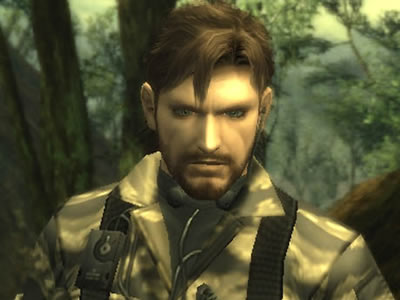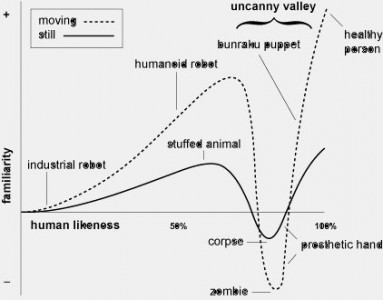Human Empathy is an interesting thing. Empathy, as you may or may not know, is the capacity to relate to something on an emotional level. It is the root of compassion, and one of our strongest connections in modern fiction. How important is empathy to the modern Game Designer? While many modern games rely on a strong multiplayer setting, it is doubtful that the single player story’s will ever be phased out. Just about any Hardcore gamer has that one game they connected with on another level, be it with a blonde haired mercenary with an oversized sword, or an rouge soldier, facing the betrayal of his superiors. Where is the line drawn on human empathy however?
A japanese Roboticist named Masahiro Mori claims in his hypothesis from “The Uncanny Valley” that it is indeed possible to cross that line. The idea behind this theory, is that the closer something becomes to being human, the more we care about it. For instance, you would care more about a Teddy Bear then a Rock, and more about a Puppy than a Teddy Bear. It’s a simple process that as something becomes more like ourselves, we begin to attach more meaning and value to it, and the entertainment industry has known this for decades.
This is all fine and dandy, until things become a little TO close to human. Mori’s study’s found that a machine that responded to much like a human being, or looked to much like a real person gave people the creeps, or looked eerie. We could consider the film A.I. from Steven Spielberg as a good example of how something ‘too human’ can create distrust among people.
The important thing that game developer’s must be careful of these days, is avoiding that uncanny valley. Most developer’s stick to the safe side, or ‘left’ of the valley, avoiding becoming too human… However a few have tried to cross that valley, and find their character’s to be unusual, or strange to the audience. Game Developer Hideo Kojima went on record to say that his original vision for Metal Gear Solid 4 was “ten steps further” then what the game came out as, with “Realism” being step number one.
The question now is, how real do things need to become, and how important is it for game developer’s to seek empathy from their gamers? With new peripherals such as the Kinect, and greater technology such as voice, face, and motion recognition becoming common place, we may soon be conversing with artificial beings on a daily basis… Will we be comfortable with that? Or will we be forever cursed to turn on our consoles, and cringe at a highly realistic NPC, who is just step’s away from perfect? Only time will tell, but perhaps we can cross the Uncanny Valley with time and perseverance.
– Travis W. Thompkins, January 2010




Jacob Clark
January 4, 2011 at 6:08 PMLove the article! Always love to hear peoples thoughts on the design of games.